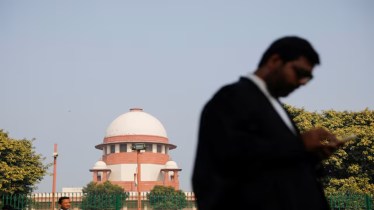In a relief for telecom operators – Bharti Airtel, Vodafone Idea, Tata Teleservices, and Indus Towers — the Supreme Court on Wednesday held that the companies can claim central value-added tax (Cenvat) credit on central excise duties paid by them on towers and their parts, green shelters, printers, office chairs, and other related materials.
The Supreme Court revoked an earlier judgement by Bombay High Court, which in 2014 ruled that the towers were not capital goods under the Cenvat Credit Rules 2004, and therefore denied telecom companies to claim any credit.
As per the Cenvat credit scheme, manufacturers and service providers can offset taxes paid on inputs, capital goods, and input services against the taxes payable on their final product or service. The same avoids any chances of cascading effect of taxes at various stages of production or service, which in a way does not lead to increase in price of final products or services.
The judgement was passed by a division bench of Justices BV Nagarathna and N Kotiswar Singh.
In 2006, the excise department issued a show cause notice to Bharti Airtel and said that the company had wrongly claimed Cenvat credit. The department also imposed a penalty equal to the credit amount and the interest.
Analysts and sector experts said the Supreme Court’s judgement allowing telecom companies to claim input tax credit on tower components and shelters will provide a crucial financial relief to telecom operators and infrastructure providers as well, which are key for the country’s digital revolution.
Prachur Sah, MD & CEO of Indus Towers said, “this pivotal ruling will have a positive impact on our company’s financial exposure.”
“The apex court’s judgement will not only help the industry in fulfilling the compliances, but will also help reduce the financial burden on the sector. By confirming to the view of the Hon’ble Delhi High Court, this verdict reinforces fairness and consistency in taxation,” said SP Kochhar, director general of Cellular Operators Association of India (COAI).
Manoj Kumar Singh, director general of the Digital Infrastructure Providers Association (DIPA) said, “the judgement will release substantial working capital that can be strategically reinvested in infrastructure development, while simultaneously reducing the overall cost of service delivery across the sector. This financial flexibility will enable faster deployment of digital infrastructure in underserved areas, addressing critical connectivity gaps in rural and remote regions.”
The infrastructure provider industry has currently rolled out over 810,000 towers nationwide.
